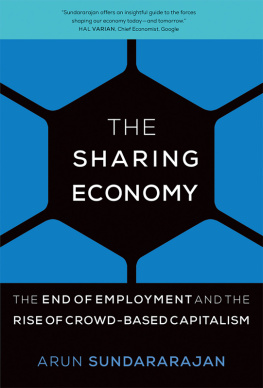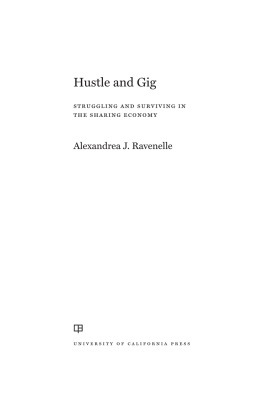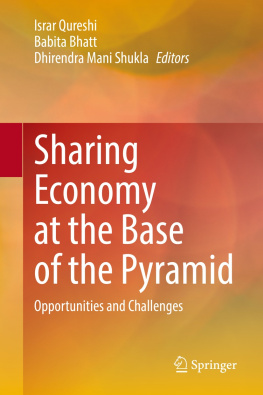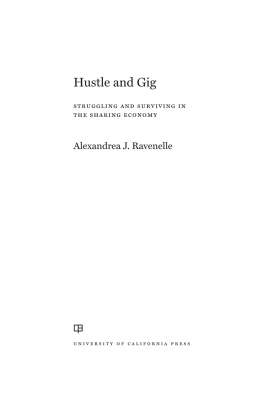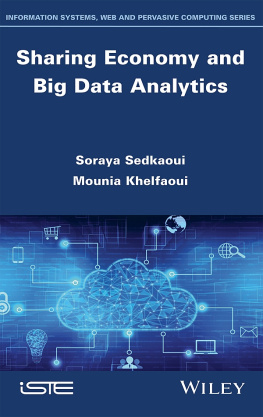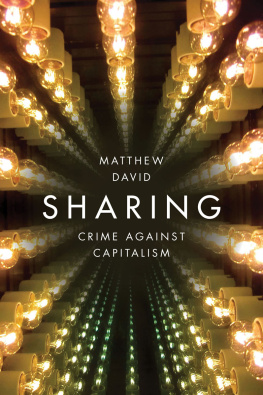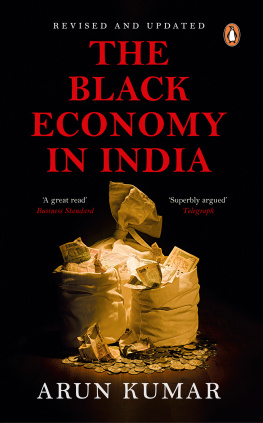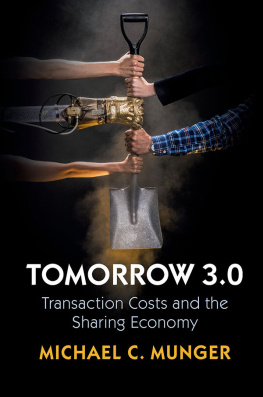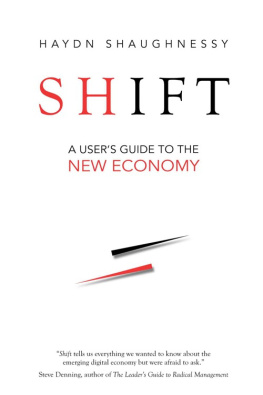Arun Sundararajan - The Sharing Economy: The End of Employment and the Rise of Crowd-Based Capitalism
Here you can read online Arun Sundararajan - The Sharing Economy: The End of Employment and the Rise of Crowd-Based Capitalism full text of the book (entire story) in english for free. Download pdf and epub, get meaning, cover and reviews about this ebook. year: 2016, publisher: The MIT Press, genre: Politics. Description of the work, (preface) as well as reviews are available. Best literature library LitArk.com created for fans of good reading and offers a wide selection of genres:
Romance novel
Science fiction
Adventure
Detective
Science
History
Home and family
Prose
Art
Politics
Computer
Non-fiction
Religion
Business
Children
Humor
Choose a favorite category and find really read worthwhile books. Enjoy immersion in the world of imagination, feel the emotions of the characters or learn something new for yourself, make an fascinating discovery.
- Book:The Sharing Economy: The End of Employment and the Rise of Crowd-Based Capitalism
- Author:
- Publisher:The MIT Press
- Genre:
- Year:2016
- Rating:4 / 5
- Favourites:Add to favourites
- Your mark:
- 80
- 1
- 2
- 3
- 4
- 5
The Sharing Economy: The End of Employment and the Rise of Crowd-Based Capitalism: summary, description and annotation
We offer to read an annotation, description, summary or preface (depends on what the author of the book "The Sharing Economy: The End of Employment and the Rise of Crowd-Based Capitalism" wrote himself). If you haven't found the necessary information about the book — write in the comments, we will try to find it.
The wide-ranging implications of the shift to a sharing economy, a new model of organizing economic activity that may supplant traditional corporations.
Arun Sundararajan: author's other books
Who wrote The Sharing Economy: The End of Employment and the Rise of Crowd-Based Capitalism? Find out the surname, the name of the author of the book and a list of all author's works by series.
The Sharing Economy: The End of Employment and the Rise of Crowd-Based Capitalism — read online for free the complete book (whole text) full work
Below is the text of the book, divided by pages. System saving the place of the last page read, allows you to conveniently read the book "The Sharing Economy: The End of Employment and the Rise of Crowd-Based Capitalism" online for free, without having to search again every time where you left off. Put a bookmark, and you can go to the page where you finished reading at any time.
Font size:
Interval:
Bookmark:
Arun Sundararajan
The MIT Press
Cambridge, Massachusetts
London, England
2016 Arun Sundararajan
All rights reserved. No part of this book may be reproduced in any form by any electronic or mechanical means (including photocopying, recording, or information storage and retrieval) without permission in writing from the publisher.
This book was set in Sabon LT Std by Toppan Best-set Premedia Limited. Printed and bound in the United States of America.
Library of Congress Cataloging-in-Publication Data
Names: Sundararajan, Arun, author.
Title: The sharing economy : the end of employment and the rise of crowd-based capitalism / Arun Sundararajan.
Description: Cambridge, MA : The MIT Press, 2016. | Includes bibliographical references and index.
Identifiers: LCCN 2015039935 | ISBN 9780262034579 (hardcover : alk. paper)
eISBN 9780262333405
Subjects: LCSH: Economic geography. | Space in economics. | CapitalismSocial aspects. | Business networks.
Classification: LCC HF1025 .S86 2016 | DDC 330dc23 LC record available at http://lccn.loc.gov/2015039935
10987654321
For my parents, who taught me how to write; my sister Anu, who showed me, through her prose and poetry, how its done well; and my dearest little girl Maya, who inspires me every day to imagine and create a better future.
This is my first book, so I am tempted to reach far back into the past to acknowledge all of the people who have shaped the thinking it contains. To ensure that this note does not rival a book chapter in its length, I am forced to focus on a select few. If I have inadvertently failed to include you, and you know me, then you know that Im both forgetful and grateful. Thank you. (And visit http://oz.stern.nyu.edu/thanksforsharing where I will continue to update this note.)
I see the changes we label the sharing economy as the current phase of an ongoing evolution of the economy and society that is shaped in part by digital technologies. This is the topic of my program of research and scholarship at NYU. When I began investigating this evolution many years ago, two colleaguesVasant Dhar and Roy Radnerwere especially important intellectual influences and mentors. As I have continued to study the economics and sociology of digital technologies over the past decade, I have benefitted immensely from conversations with a number of current and former colleagues at NYU, including Ulrich Baer, David Backus, Yannis Bakos, Luis Cabral, Rohit Deo, Cynthia Franklin, Scott Galloway, Anindya Ghose, Peter Henry, John Horton, Joanne Hvala, Panos Ipeirotis, Srikanth Jagabathula, Sarah Labowitz, Natalia Levina, Hila Lifshitz-Assaf, Geeta Menon, Elizabeth Morrison, Beth Murray, Rika Nazem, Jessica Neville, Mandy Osborne, Patrick Perry, Michael Posner, Foster Provost, Paul Romer, Clay Shirky, Kristen Sosulski, Raghu Sundaram, Prasanna Tambe, Jamie Tobias, Alexander Tuzhilin, Mike Uretsky, Timothy Van Zandt, Niobe Way, Lawrence White, Norman White, Luke Williams, and Eitan Zemel. I am also eternally grateful to Sharon Kim and Shirley Lau, who inject some semblance of organization and structure into my professional life, and without whom I would not have managed to create the time to write this book.
I have had hundreds of conversations with executives, activists, policy makers, and thinkers connected to the sharing economy. I recount many of these in the book, and am particularly happy that Jennifer Billock, Brian Chesky, Antonin Leonard, Adam Ludwin, Frdric Mazella, Benjamin Tincq, and John Zimmer took the time to sit down and speak to me specifically in connection with its writing. Numerous other fascinating conversations have helped me fit together the pieces of the complex puzzle that is the sharing economy. Some that were quite influential early on were with Odile Beniflah, Lauren Capelin, Shelby Clark, Sunil Paul, Jessica Scorpio, Erica Swallow, Molly Turner, and Hal Varian. Some of the others that were especially notable and/or frequent were with Bhavish Aggarwal, Alisha Ali, Douglas Atkin, Michel Avital, Emily Badger, Mara Balestrini, Yochai Benkler, Rachel Botsman, danah boyd, Nathan Blecharczyk, Jennifer Bradley, Erik Brynjolfsson, Valentina Carbone, Emily Castor, David Chiu, Marc-David Chokrun, Sonal Choksi, Peter Coles, Chip Conley, Ariane Conrad, Arnab Das, Cristian Fleming (and his team at the Public Society), Richard Florida, Natalie Foster, Justin Fox, Liz Gannes, Lisa Gansky, Marina Gorbis, Neal Gorenflo, Alison Griswold, Vijay Gurbaxani, Tanner Hackett, Aassia Haroon Haq, Scott Heiferman, Jeremy Heimans, Sara Horowitz, Sam Hodges, Milicent Johnson, Noah Karesh, Stephane Kasriel, Sarah Kessler, David Kirkpatrick, Marjo Koivisto, Karim Lakhani, Kevin Laws, Michael Luca, Benita Matofska, Andrew McAfee, Ryan McKillen, Lesa Mitchell, Amy Nelson, Jeff Nickerson, Melissa OYoung, Janelle Orsi, Jeremy Osborn, Jeremiah Owyang (to whom I owe a special debt of gratitude for his remarkably selfless sharing of ideas and data), Wrede Petersmeyer, Ai-Jen Poo, Andrew Rasiej, Simone Ross, Anita Roth, Chelsea Rustrum, Carolyn Said, Marcela Sapone, Marie Schneegans, Trebor Scholz, Swati Sharma, Clay Shirky, Dane Stangler, Alex Stephany, James Surowiecki, Jason Tanz, Marie Ternes, Henry Timms, Viv Wang, Cheng Wei, Adam Werbach, Jamie Wong, Caroline Woolard, and numerous members of the OuiShare collective (including Flore Berlingen, Julie Braka, Albert Caigueral, Simone Cicero, Javier Creus, Arthur De Grave, Elena Denaro, Diana Fillipova, Marguerite Grandjean, Asmaa Guedira, Ana Manzanedo, Bernie Mitchell, Edwin Mootoosamy, Ruhi Shamim, Maeva Tordo and especially Francesca Pick).
I have also benefitted from numerous focused discussions about specific topic areas. These include conversations with: Neha Gondal about the sociology of the sharing economy; Ravi Bapna, Verena Butt dEspous, Juan Cartagena, Chris Dellarocas, Alok Gupta, and Sarah Rice about trust; Paul Daugherty, Peter Evans, Geoffrey Parker, Anand Shah, Marshall Van Alstyne, and Bruce Weinelt about platforms; Brad Burnham, Kanyi Maqubela, Simon Rothman, Craig Shapiro, and Albert Wenger about venture capital; Janelle Orsi, Nathan Schreiber, and Trebor Scholz about cooperatives; Umang Dua, Oisin Hanrahan, Micah Kaufmann, and Juho Makkonen about marketplace models; Gene Homicki about alternative rental models; Primavera De Filipi and Matan Field about the blockchain and decentralized peer-to-peer technologies; Ashwini Chhabra, Molly Cohen, Althea Erickson, David Estrada, Nick Grossman, David Hantman, Alex Howard, Meera Joshi, Veronica Juarez, Chris Lehane, Mike Masserman, Padden Murphy, Joseph Okpaku, Brooks Rainwater, April Rinne, Sofia Ranchordas, Michael Simas, Jessica Singleton, Adam Thierer, and Bradley Tusk about regulation; Elena Grewal, Kevin Novak, and Chris Pouliot about the use of data science in the sharing economy; Nellie Abernathy, Cynthia Estlund, Steve King, Wilma Liebman, Marysol McGee, Brian Miller, Michelle Miller, Caitlin Pearce, Libby Reder, Julie Samuels, Kristin Sharp, Dan Teran, Felicia Wong, and Marco Zappacosta about the future of work. I am also thankful to Congressman Darrell Issa, Congressman Eric Swalwell, and Senator Mark Warner for their leadership and for many conversations about critical sharing economy policy issues.
My current and former students and collaborators have provided me with invaluable assistance and inspiration as I have explored the varied facets of this new model of organizing economic activity. My scientific research about the sharing economy would not have been possible without Hilary Jane Devine, Apostolos Fillipas, Samuel Fraiberger, Carlos Herrera-Yague, Marios Kokkodis, Marella Martin, Mareike Mohlmann, Lauren Morris and Lauren Rhue. I am also grateful for financial support for some of this research from the Ewing Marion Kauffman Foundation and Google Research. The results of a wide variety of independent study projects undertaken by my NYU undergraduates and MBA students have helped mold my early-stage research and thinking: the ones that stand out were by Humaira Faiz, Sydnee Grushack, Andrew Ng, and Jara Small (on inclusive growth in the sharing economy); Jonah Blumstein, Valeriya Greene and Eric Jacobson (on Airbnb and city regulations); Andrew Covell, Varun Jain, and June Khin (on the organization of sharing economy platforms); Phil Hayes (on surge pricing); Dmitrios Theocharis and Siri Zhan (on the on-demand workforce); Ann Dang, Louise Lai, and Daniella Tapia (on the global variation in regulation); Lauren Tai (on regulating autonomous vehicles); Karl Gourgue, Manasa Grandhi, and Joyce Fei (on decentralized models of research); Arra Malek, Ansh Patel, and Haley Zhou (on apparel rental models); Laura Kettell and Karina Alkhasyan (on peer-to-peer finance); and Keerthi Moudgal (on peer-to-peer retailing).
Font size:
Interval:
Bookmark:
Similar books «The Sharing Economy: The End of Employment and the Rise of Crowd-Based Capitalism»
Look at similar books to The Sharing Economy: The End of Employment and the Rise of Crowd-Based Capitalism. We have selected literature similar in name and meaning in the hope of providing readers with more options to find new, interesting, not yet read works.
Discussion, reviews of the book The Sharing Economy: The End of Employment and the Rise of Crowd-Based Capitalism and just readers' own opinions. Leave your comments, write what you think about the work, its meaning or the main characters. Specify what exactly you liked and what you didn't like, and why you think so.

